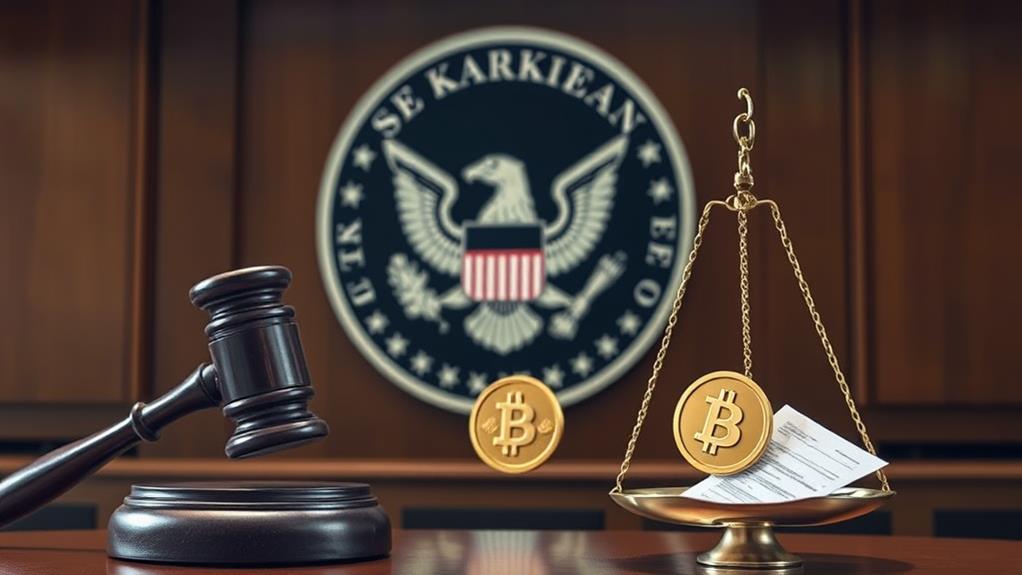
The SEC has advanced its lawsuit against Kraken, accusing the exchange of violating securities laws by possibly offering unregistered securities and misleading investors. Judge Orrick's decision to deny Kraken's motion to dismiss legitimizes the SEC's claims and sets an important precedent for crypto regulation. This development necessitates a thorough reassessment of compliance strategies for crypto platforms and suggests potential shifts in future regulation, which could increase operational costs but also foster market stability. The outcome of this case may greatly impact investor strategies and overall market dynamics. Learn more about the implications of this essential legal battle.
Table of Contents
SEC Allegations Overview

The SEC has leveled serious accusations against Kraken, asserting that the cryptocurrency exchange has violated securities laws. Central to the allegations is Kraken's purported failure to adhere to crypto compliance standards, thereby potentially misleading investors. The SEC contends that Kraken's operations lack regulatory clarity, potentially categorizing certain digital assets as unregistered securities. This lawsuit underscores the SEC's commitment to ensuring that cryptocurrency platforms operate within the legal frameworks designed to protect investors. The outcome of this case is pivotal, as it could set a precedent for how crypto-securities are defined and regulated. For an industry driven by the ethos of freedom and decentralization, achieving compliance without stifling innovation remains a critical challenge.
Judge Orrick's Ruling
Judge Orrick's recent ruling has considerably influenced the SEC's lawsuit trajectory against Kraken, allowing the case to advance by rejecting Kraken's motion to dismiss. This decision underscores the validity of the SEC's claims and establishes a significant legal precedence for regulatory oversight in the cryptocurrency sector. Investors and market participants are keenly observing the market implications of this development, understanding it as a bellwether for future regulatory actions.
- Emphasizes the SEC's stance on crypto regulation.
- Sets a legal benchmark for other pending and future cases.
- Reinforces the scrutiny on crypto exchanges within U.S. jurisdiction.
- Alters the risk landscape for crypto platforms operating in the market.
- Signals potential changes in compliance strategies for industry players.
Compliance Strategies

Given the heightened regulatory scrutiny following Judge Orrick's ruling, cryptocurrency exchanges must urgently reassess their compliance strategies to align with U.S. securities laws. Emphasizing operational transparency and robust risk management will be critical in maneuvering this regulatory landscape.
| Compliance Focus | Impact | Action Required |
|---|---|---|
| Operational Transparency | Builds Trust with Regulators | Implement Clear Reporting |
| Risk Management | Mitigates Legal Risks | Develop extensive Policies |
| Regulatory Alignment | Guarantees Legal Compliance | Conduct Regular Audits |
| Investor Protection | Enhances Market Stability | Increase Security Measures |
| Proactive Measures | Prevents Future Issues | Stay Updated on Regulations |
Exchanges must employ proactive measures, guaranteeing they can operate freely while maintaining compliance.
Future Regulation
Looking ahead, the regulatory landscape for cryptocurrency is poised for considerable transformation. The SEC's actions against Kraken underscore a broader push towards establishing cryptocurrency standards and achieving regulatory clarity. This evolving environment aims to balance innovation with investor protection, which will considerably shape the future operations of crypto exchanges.
- Enhanced cryptocurrency standards will emerge, providing a clearer framework for businesses.
- Global regulatory cooperation is likely to increase, harmonizing rules across borders.
- Greater transparency in cryptocurrency transactions will become a norm.
- Compliance costs for crypto platforms may rise as they adapt to new regulations.
- Investor confidence could grow, fostering a more stable and mature market.
Such changes are pivotal for an industry that thrives on freedom and innovation.
Investor Implications

The unfolding legal battle between the SEC and Kraken is a stark reminder for investors to remain vigilant. This case can notably impact market volatility and necessitates a re-evaluation of investment strategies. Investors must keep a close watch on the legal proceedings to mitigate risks and make informed decisions.
| Factor | Implications for Investors |
|---|---|
| Market Volatility | Increased short-term fluctuations |
| Regulatory Changes | Need for adaptable strategies |
| Legal Precedents | Potential for new compliance norms |
| Portfolio Management | Importance of diversification |
| Information Monitoring | Essential for proactive decisions |
Understanding these dynamics will empower investors to navigate the evolving landscape while safeguarding their portfolios. Staying updated on regulatory developments is vital for maintaining freedom in investment choices.
Conclusion
The SEC's lawsuit against Kraken illuminates the regulatory storm clouds gathering over the cryptocurrency landscape. Judge Orrick's ruling serves as a harbinger of intensified oversight, compelling industry stakeholders to navigate these turbulent waters with renewed compliance strategies. As the regulatory framework evolves, the intricate dance between innovation and regulation will dictate the future of cryptocurrency trading in the United States. Investors must brace for seismic shifts that could reshape market dynamics and recalibrate investment paradigms.







